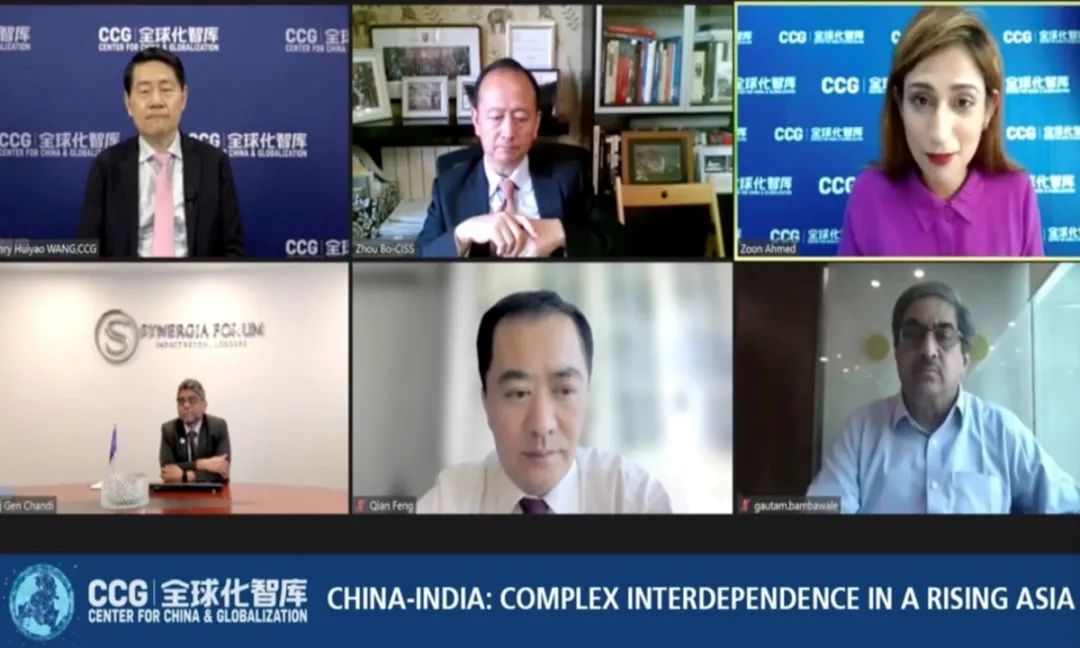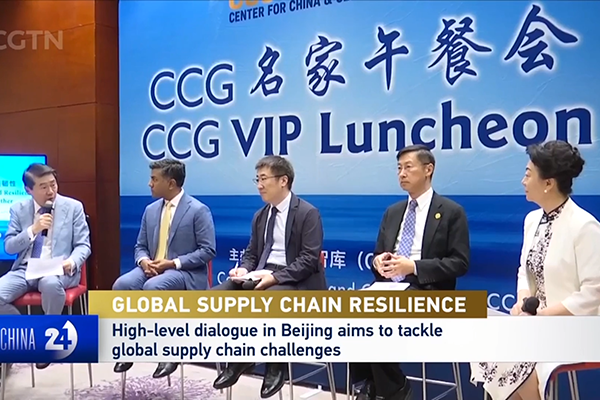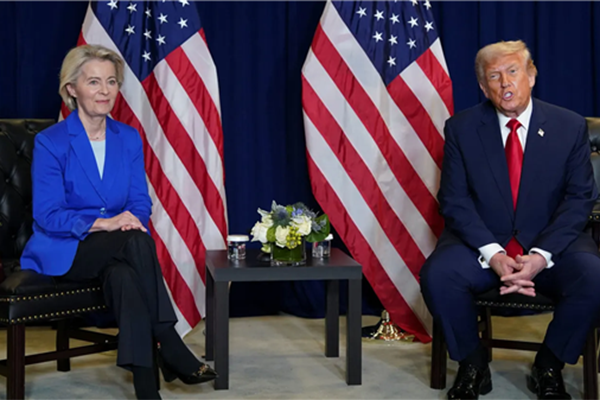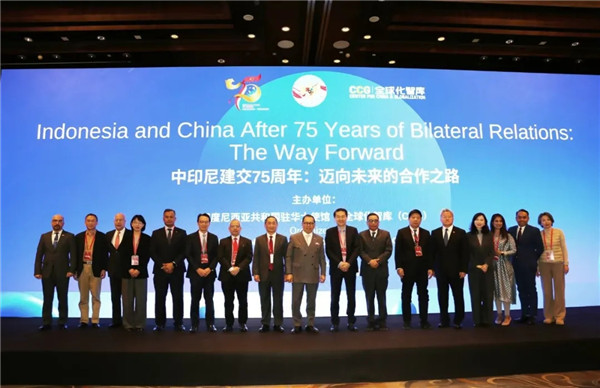[Global Times] Chinese, Indian observers underscore rebuilding trust
August 10 , 2022Screenshot of the online event themed “China-India: Complex Interdependence in a Rising Asia”
With some positive signals emerging in China-India relations, which have encountered severe difficulties following the border dispute since 2020, both Chinese and Indian observers have acknowledged the importance of rebuilding trust between the two countries, especially when the two sides continued working together in multilateral organizations such as the BRICS and SCO. Still, differences remain in areas such as how to view the border dispute within the bilateral relationship, and how to peacefully coexist in the Indian Ocean.
“I believe that India has taken a very practical approach to our relations with China. But at the same time, I think none of us have any doubt that there is a lack of trust between two countries, which needs to be repaired, and that can only be done slowly over a period of time, with conversations like this, but also extending to governments,” Gautam Bambawale, former ambassador of India to China, said during an online video event on Wednesday.
“As far as India is concerned, it is very difficult to divorce the situation on the border from the rest of the relationship. In fact, it will not happen,” Bambavale said, noting that “therefore we will have to ensure that there is peace and tranquility on the border if the rest of the relationship has to move ahead, to build further trust and understanding between two countries.”
The online event, themed “China-India: Complex Interdependence in a Rising Asia”, was hosted by the Chinese non-governmental think tank Center for China and Globalization with Indian think tank Synergia Foundation. Since the outbreak of the COVID-19 pandemic and border clashes in 2020, China and India have entered a new phase of complex interdependence and mistrust but also deepening and diversifying cooperation.
The former diplomat to China laid out ways to rebuild trust. For example, from the perspective of military, he showed the desire for disengagement and de-escalation on the border. “Events on the border will impact the relationship, and it could deteriorate if we don’t work hard together to rebuild the trust that existed before 2020,” Bambavale said.
The fundamental differences between the two sides on the border dispute have existed for many years, as Indians consider that as long as the dispute isn’t solved, other areas of cooperation and the bilateral relationship’s development would become meaningless. But Chinese people insist that the border issue should not affect overall bilateral ties, Qian Feng, director of the research department at the National Strategy Institute at Tsinghua University, who was also one of the speakers at the event, told the Global Times on Wednesday.
China and India held the 16th commander-level talks in mid-July, the third this year, which marked an overall positive atmosphere between the two neighbors, although some experts believe it will take some time for the two countries to figure out a solution both sides can accept.
However, CNN recently reported that the US is to take part in a joint military exercise with India less than 100 kilometers from the South Asian country’s “disputed border” with China. The military drills will be held in mid-October at an altitude of 10,000 feet in Auli in the Indian state of Uttarakhand and will focus on high-altitude warfare training, CNN said, citing a senior Indian Army officer with knowledge of the matter.
“The drills were pre-planned, but India insisting on doing so amid the deteriorating US-China relationship could send a bad signal for the China-India relationship,” Qian said.
During the online event, some experts also mentioned the economic interdependence of the Chinese and Indian markets and areas where the two sides could deepen their cooperation such as people exchanges, tourism and services, as well as the digital economy.
“Despite the ups and downs in the bilateral relationship in recent years, I believe India and China can find some common ground in following areas such as trade and investment, as China is the second the largest economy in the world and India is supposed to surpass Japan and become the third largest economy in a decade,” Wang Huiyao, founder of CCG, told at the event, noting that the two countries could explore the potentials to build up the biggest market in the world.
“China and India have built a strong partnership on AIIB… and not to mention that India is also the co-founder of the New Development Bank, along with China among the BRICS countries,” he said. “The two-way trade volume has soared about 43 percent year-on-year, showing the tremendous growth there.”
“The world is still suffering from the pandemic and some countries are battling with high inflation. With all these crises [there is a need] that Indian and China really [have to] work together,” he said, noting that the two countries should not decouple as the two largest developing countries share a lot of similarities.
But some Indian experts voiced concerns over the trade deficit. “There is a serious way of thinking in India that the asymmetric interdependence is in favor of China. So the next steps would be obviously the decoupling process,” Srikanth Kondapalli, professor at the Jawaharlal Nehru University New Delhi, said at the event. “That intensified with the Galwan Valley clash in June 2020, and that is where geopolitics enters in economic interdependence.”
Zhou Bo, a researcher at the Center for International Security and Strategy at Tsinghua University, also raised a question about how India and China could coexist in the Indian Ocean by citing the latest example of India’s pressure on Sri Lanka to defer the arrival of a Chinese research vessel at a Sri Lankan port, citing so-called national security concerns.
“I agree with the [former] ambassador Bambavale that we have a severe lack of trust, and this actually is also seen most recently in India,” Zhou noted, referring to India’s interference with Chinese ship Yuan Wang 5’s docking.
“So India, I believe, would consider the Indian Ocean very much like India’s ocean. But this is not possible,” he said, noting that if India believes that this is its exclusive sphere of influence, then China’s interests would clash with its interests.
Some positive signals in the China-India relationship have emerged since the beginning of this year.
On Tuesday evening, a chartered plane carrying 107 Indian businessmen arrived at Hangzhou, East China’s Zhejiang Province, which is the first charter flight for Indian businessmen to China. China also started the process for the return of Indian students stuck back home due to the COVID-19 visa restrictions, and the first batch may arrive soon, according to reports from Indian media outlets on Tuesday.
However, in the eyes of Chinese experts, in spite of the enhanced communication against the backdrop of the Ukraine crisis, and the gradual resumption of people-to-people exchanges, China-India ties remain at a relatively low level.
“Though the communication has been enhanced amid the Ukraine crisis and the two sides increased the management of the border situation, the official stances of the two countries have been significantly different from each other, and also people-to-people exchanges are still being limited due to the COVID-19 restrictions,” Qian said.







